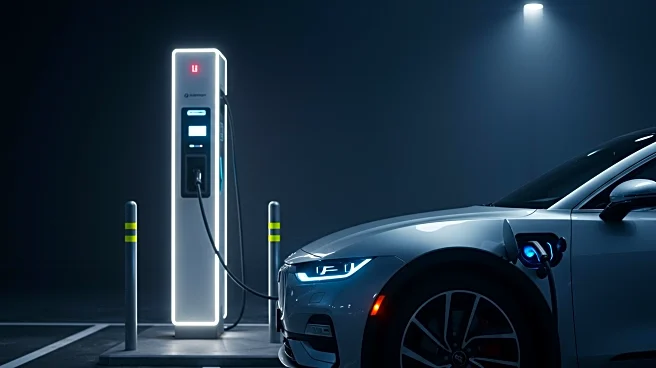What's Happening?
The Porsche Taycan Turbo GT, an all-electric supercar, has achieved a significant milestone in electric vehicle (EV) technology by tying the fastest EV recharge time ever recorded in testing by Car and Driver. The vehicle charged from 10% to 90% in just 24 minutes, despite having a 97-kilowatt-hour battery. This translates to an average charging rate of 213 kW, surpassing competitors such as the BMW i4, Mercedes-Benz EQS, and Chevy Bolt. The Taycan Turbo GT can reach a peak DC fast-charging speed of 320 kW, allowing drivers to charge nearly two-thirds of the battery in just 10 minutes. This advancement in charging technology means less time spent at charging stations and more confidence for drivers on long trips. The Taycan offers 270 miles of highway range and no tailpipe emissions, providing an environmentally friendly alternative to traditional gas-powered supercars.
Why It's Important?
The rapid charging capability of the Porsche Taycan Turbo GT represents a significant advancement in EV technology, potentially increasing the appeal of electric vehicles to a broader audience. Faster charging times address one of the main concerns of potential EV buyers: the inconvenience of long charging durations. This development could accelerate the adoption of EVs, contributing to reduced carbon emissions and supporting global efforts to combat climate change. Additionally, the Taycan's performance and environmental benefits highlight the potential for EVs to replace traditional combustion engine vehicles without sacrificing performance or convenience. This shift could have substantial implications for the automotive industry, influencing manufacturing priorities and consumer preferences.
What's Next?
As automakers continue to innovate, the trend towards faster charging and improved EV performance is expected to continue. This could lead to increased competition among manufacturers to develop even more efficient and user-friendly electric vehicles. The success of the Taycan Turbo GT may prompt other companies to invest in similar technologies, potentially leading to a broader range of high-performance EV options for consumers. Additionally, the integration of home solar systems with EV charging could further enhance the cost-effectiveness and environmental benefits of electric vehicles, encouraging more consumers to make the switch from traditional vehicles.
Beyond the Headlines
The advancements in EV charging technology, as demonstrated by the Porsche Taycan Turbo GT, could have broader implications beyond the automotive industry. The increased adoption of EVs may drive demand for renewable energy sources, such as solar power, to support sustainable charging solutions. This could lead to growth in the renewable energy sector and further investments in clean energy infrastructure. Moreover, the shift towards electric vehicles may influence urban planning and transportation policies, as cities adapt to accommodate the growing number of EVs on the road.









